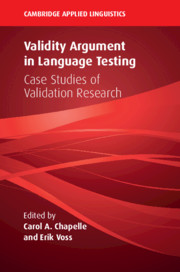Book contents
- Validity Argument in Language Testing
- The Cambridge Applied Linguistics Series
- Validity Argument in Language Testing
- Copyright page
- Contents
- Figures
- Tables
- Contributors
- Series Editor’s Preface
- 1 Introduction to Validity Argument in Language Testing and Assessment
- Part I Basic Concepts and Uses of Validity Argument in Language Testing and Assessment
- Part II Investigating Score Interpretations
- Part III Investigating Score Uses and Consequences
- 10 Justifying the Interpretation and Use of an ESL Writing Final Examination
- 11 An Argument for Use of a Test of Productive Grammatical Ability for Placement into Writing Classes
- 12 Investigating the Consequences of an ESL Placement Test
- Part IV Conclusion
- Index
- References
11 - An Argument for Use of a Test of Productive Grammatical Ability for Placement into Writing Classes
from Part III - Investigating Score Uses and Consequences
Published online by Cambridge University Press: 14 January 2021
- Validity Argument in Language Testing
- The Cambridge Applied Linguistics Series
- Validity Argument in Language Testing
- Copyright page
- Contents
- Figures
- Tables
- Contributors
- Series Editor’s Preface
- 1 Introduction to Validity Argument in Language Testing and Assessment
- Part I Basic Concepts and Uses of Validity Argument in Language Testing and Assessment
- Part II Investigating Score Interpretations
- Part III Investigating Score Uses and Consequences
- 10 Justifying the Interpretation and Use of an ESL Writing Final Examination
- 11 An Argument for Use of a Test of Productive Grammatical Ability for Placement into Writing Classes
- 12 Investigating the Consequences of an ESL Placement Test
- Part IV Conclusion
- Index
- References
Summary
This chapter demonstrates the construction of a validity argument for use of a new test of productive academic grammar test as one source of data for placement of students into academic writing classes. Drawing upon an argument-based approach, warrants and assumptions for the utilization and consequence implication inferences were developed to guide the investigation. Mixed methods were used to investigate hypothetical placement outcomes and impacts of academic grammar test score use on the program, test takers, and ESL writing instructors. Findings supported the assumptions by showing that (a) the value of grammatical writing ability is appreciated by all stakeholder groups; (b) academic grammar test scores can identify false positives identified as qualifying for ESL writing exemption; and (c) both test takers and ESL writing instructors would benefit from the use of academic grammar test scores for ESL writing placement and diagnostic feedback that could be generated. This study demonstrates that prospective test use and consequences can be investigated even at a pilot testing stage, when test developers should identify and minimize potential negative impact on stakeholders to improve the quality of the test and the compose appropriate advice about its use.
Keywords
Information
- Type
- Chapter
- Information
- Validity Argument in Language TestingCase Studies of Validation Research, pp. 264 - 293Publisher: Cambridge University PressPrint publication year: 2021
